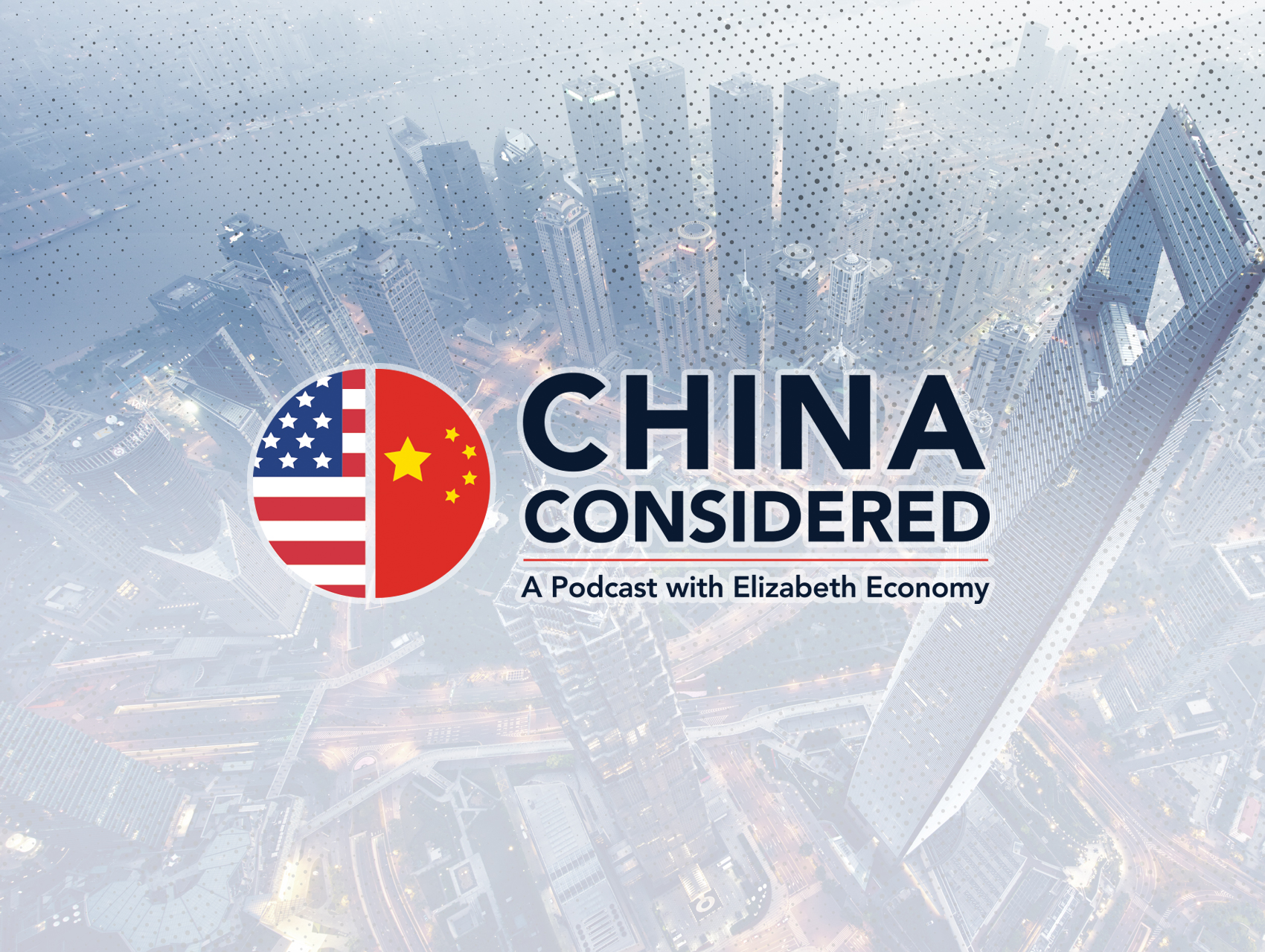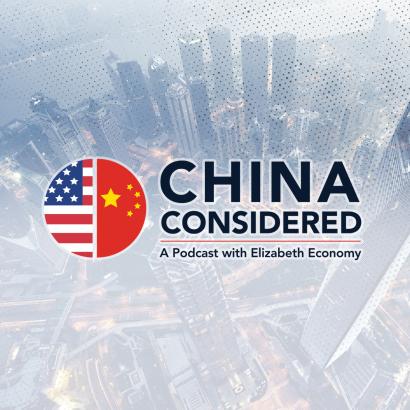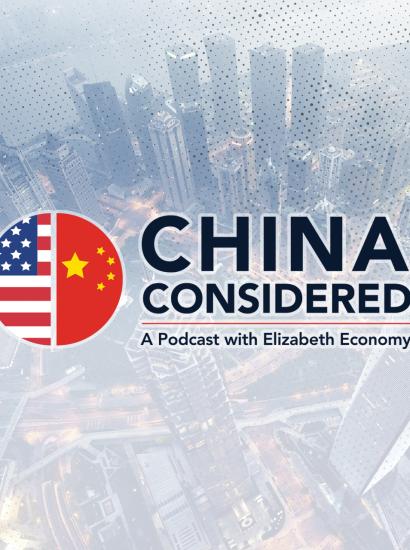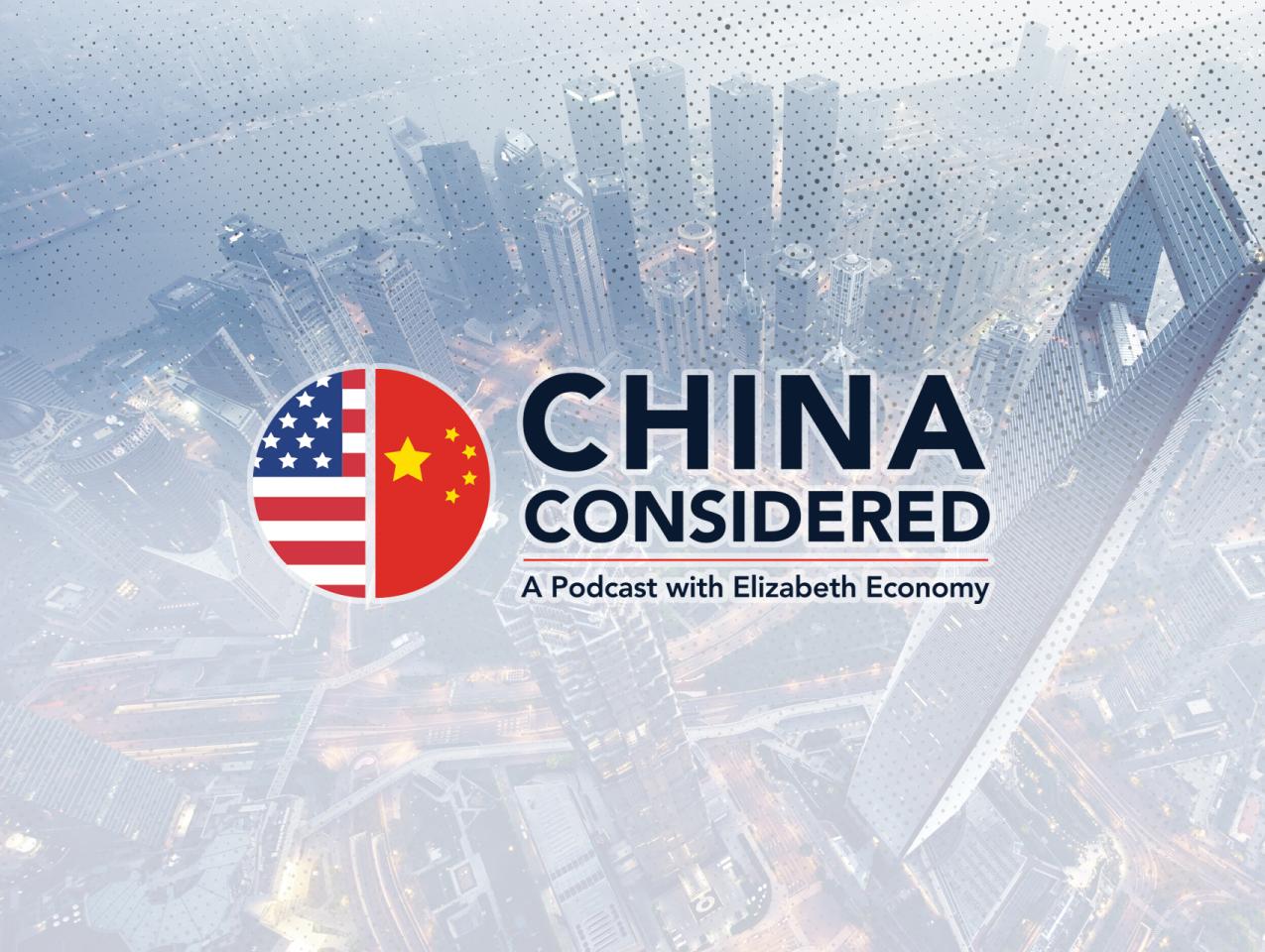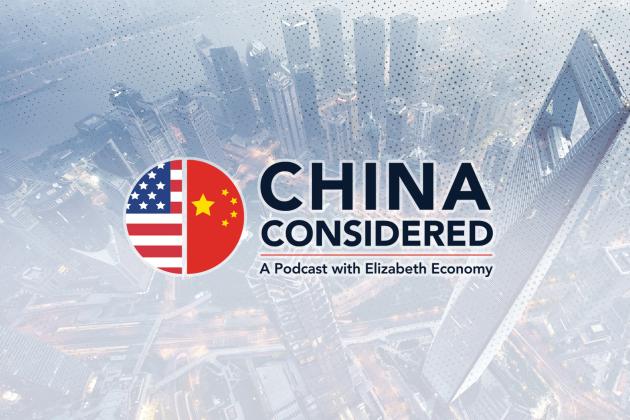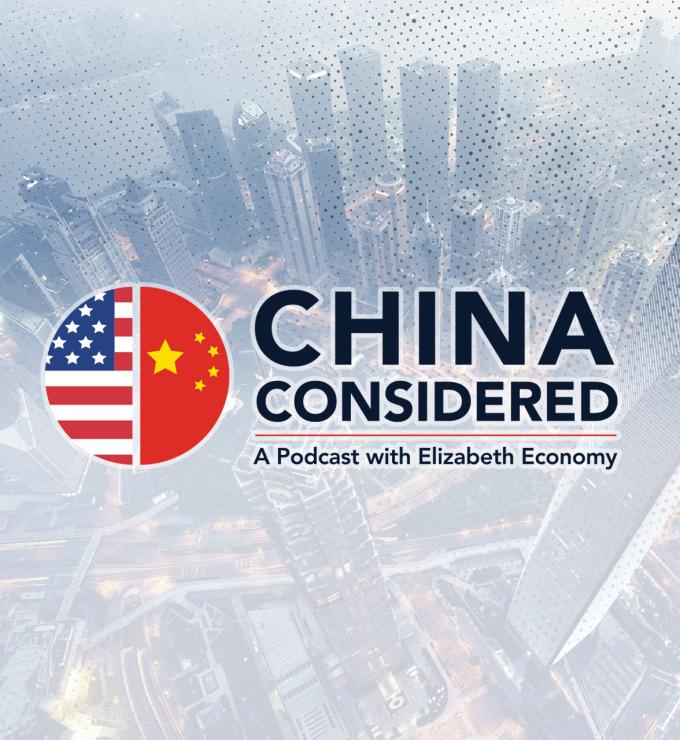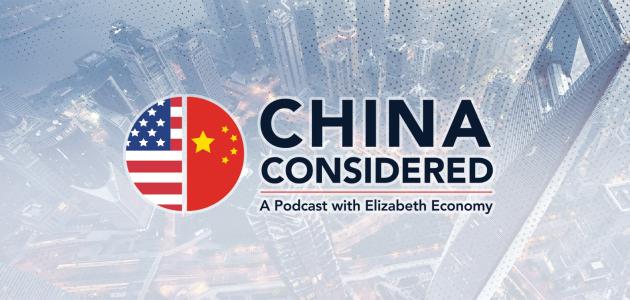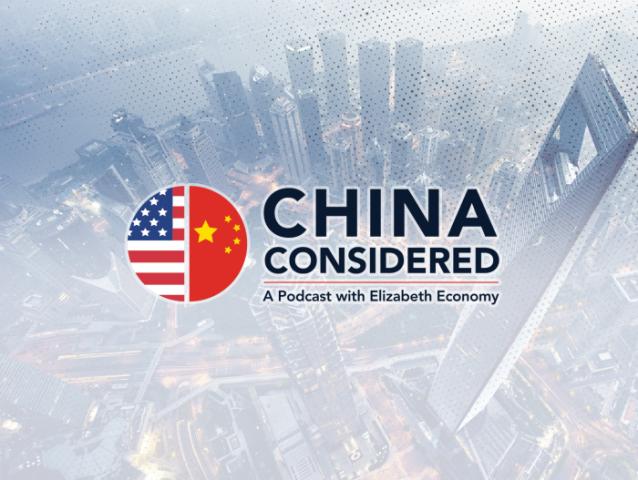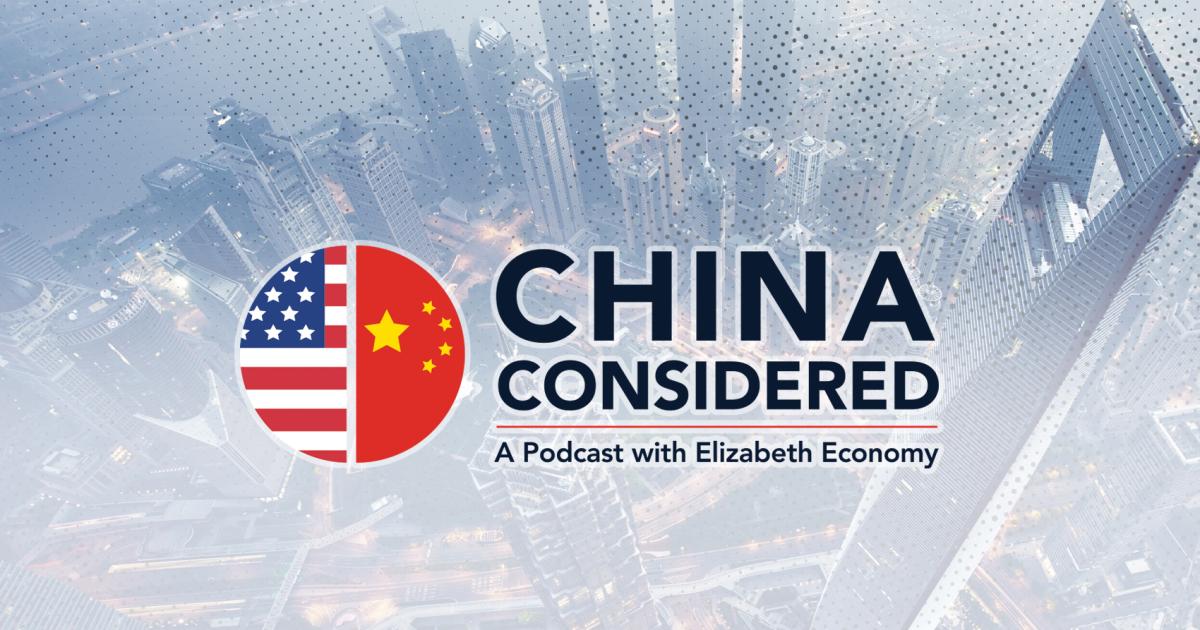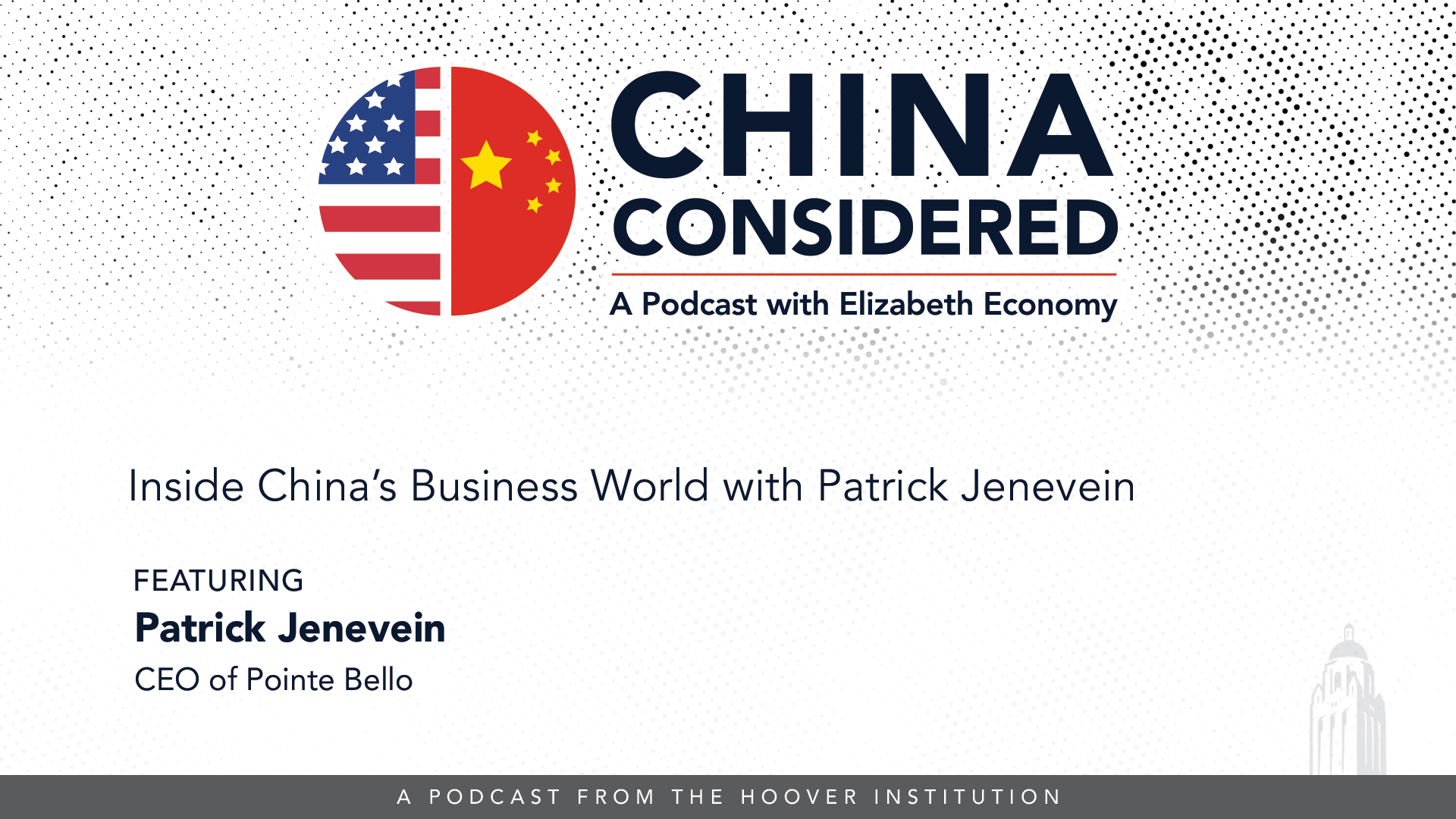- China
- Confronting and Competing with China
Dr. Elizabeth Economy sits down with Patrick Jenevein to discuss his career in the energy industry in China, the outlook for foreign individuals and companies seeking to do business in the country, and his new book - Dancing with the Dragon. Jenevein, who worked in the country for more than 20 years, recounts a collection of stories ranging from one of his company’s first deals in the country’s far west, negotiating with one of Deng Xiaoping’s top advisers to detailing the frustrations that eventually led him to leave the country.
Recorded on March 26, 2025.
WATCH THE EPISODE
>> Elizabeth Economy: Welcome to China Considered, a podcast that brings fresh insights and informed discussion to one of the most consequential issues of our time, how China's changing and changing the world. I'm Liz Economy, Hargrove Senior Fellow and co-director of the US, China and the World Program at the Hoover Institution at Stanford University.
Today I have with me Patrick Jenevein, the author of a terrific new book, Dancing with the Cautionary Tales of the New China from an Old China Hand. Patrick's a Texan who, not surprisingly, has spent most of his life in the energy business. More surprisingly, perhaps most of that time was spent doing business with China.
The book is a firsthand account of what I think was a true roller coaster ride that changed not only Patrick's business, but also his life. Patrick, it's great to have you with us.
>> Patrick Jenevein: Thank you, Liz, it's a treat to be with you, as always.
>> Elizabeth Economy: So, Patrick, before we get started, just flash the COVID of your book.
Because it's such a great cover. I want people to be able to see it. There you go. And the dragon is the sort of typical emblem for China. Is there a reason that you decided to have that on your book?
>> Patrick Jenevein: Yes, and it's a five toed dragon, which makes it an imperial dragon, which tells the imperial force in the PRC right now, we're paying attention to you.
>> Elizabeth Economy: I love that.
>> Patrick Jenevein: Very specifically, and I know you also had the book released on October 1, 2024, which was the 75th anniversary of the founding of the People's Republic of China. And I saw in an interview that you said it was a birthday present to the Chinese government.
And I have to say, having read the book, I thought it's probably a present that they would like you to take back at this point. But we'll get to that, I think, in our discussion. So let me start now with your first trip to China, which was in 1995.
Why did you go? Where did you go? What was the result? I mean, you already had a successful business in Texas. What prompted you to, you know, travel to China? As a young, ambitious man, we wanted to expand our business, we wanted to grow, and we looked at going to California.
And Gray Davis at the time talked about Texans as Texas power Pirates. And a guy, Bob Falleen, that I had known from the First National Bank in Dallas, worked in both Shanghai and San Francisco. And I met with him and he said that the communists are much harder to deal with in San Francisco.
That's all I needed. And growing up in Texas, you're used to being pushed to frontiers, or not necessarily pushed, but drawn to frontiers and drawn to frontier challenges. And natural gas, we were really good at natural gas processing. And a guy named Imin Jan, PhD physicist from the University of Houston, retired from ARCO when the price of oil dropped to $8 a barrel, but had grown up in Taiwan.
And his family didn't have running water when he grew up. We wound up getting together to process natural gas for the China National Petroleum Corporation. That was the reason it was really interesting going out there. We had a couple of pilot projects. We needed to show that we could get equipment and personnel in, and that we could get personnel and money out, that worked.
We also started a conversation with the CIA because trying to find out who your partner was in China at the time was very difficult. Had a conversation with a guy on a desk in D.C. who said, yes, your counterparty is who you think it is. We went over to China, Dallas, to San Francisco, to Tokyo, to Beijing, to Ulamuchi, halfway around the Northern hemisphere and thinking my CIA and the USCIA is telling me I'm gonna be all right.
Well, found out that they were wrong, that there was a 50 partner. You can laugh about that now and I'll laugh about that now too, because we know better. But then in 1995, as a 30 something year old, I didn't know better. Now I do. I came back and talked to that analyst and at the end he said, well, what else do you know?
So that started an interesting relationship.
>> Elizabeth Economy: Right? And maybe we'll hear a little bit more about that a little bit later. But you know, a lot of your book is about the challenges that you faced and they were, you know, significant. But you also had some significant successes.
What do you consider to be your biggest success? Because you had a number of different ventures over the course of your, you know, two and a half decades or so.
>> Patrick Jenevein: Well, the success that matters is that we built relationships with Chinese and we made money together. And if you're making money together, you're creating jobs, you're raising everybody's boat.
And there's an affair of the tides of men which taken to the flood leads to riches. Well, we did that. We saw that we were doing good things for Chinese. We were making money doing it. Some of the emissions from our natural gas fire power plants was actually cleaner than the air many Chinese breathe.
Your book, the River Runs Black at that time was a really important book for me to be able to read because you qualified it, you researched it, and you contextualized a lot of what you did that helped people like me know we were doing the right thing, knowing that we were moving the right direction, putting our business in a position to do good and to do well by doing good things.
>> Elizabeth Economy: So, I mean, that's a great sort of very positive take on your engagement there. And you've written a lot about what it was like negotiating with the Chinese and with the Communist Party representatives that were both from the government and also, you know, in the state owned enterprises that you were working with.
You know, as you think back to that sort of negotiating style and process, you know, how much similarity was there between the way that Americans might negotiate, the kinds of deals that you were doing and what you saw and what you dealt with from the Chinese side in terms of, you know, the style and the method and the tactics and strategies.
Did you feel at home in terms of sort of working with your Chinese counterparts, or was it just an entirely new world?
>> Patrick Jenevein: It was entirely new. One of our very first pilot projects was in Kalamai, so far Western China, in Xinjiang, where the Communist Party is abusing Uyghurs.
We were going to provide a natural gas processing plant. So when natural gas comes out of the ground, it's gaseous. If you cool it or put a little pressure on it, you can liquefy it. And then if it's liquefied, then people can carry it around and in small tanks that you can put on the back of a bicycle.
So here we were pushing that idea forward and China National Petroleum Company very shrewdly paired us against the Canadian firm and gave us essentially identical contracts are identical task. We got ours, we negotiated. I left Kalamayi thinking that we were done, Imeen. Dr Jan, my partner, stayed and when by the time I got home, they had changed the deal completely.
So I sent him a fax and put confidential, you know, in big letters on the top to make sure that the Communist party people read it before imin. So here, it was almost like playing bridge where you're bidding across the table without saying everything. You think so confidential, you mean?
You've pushed our company into a position that we cannot strategically hold. We've already invested so much, we can invest more. The engineer from CNPC have out negotiated you. So there was a lot that was in there that complemented the CNPC engineers gave them a face showed that they had crushed an American businessman in negotiating, which interestingly gave them more flexibility in the future for us to work together.
So those ideas of face were fascinating to learn, another quick example. Our second pilot project was a gas fire, small gas fire, electricity generating project for a Chinese company that made carbon black, which generated for hard currency for them foreign currency reserves at the time when China needed it to get paid.
Our young engineer, Gao Yang, who had been one of the most successful engineers of the Onomuchi grid, she was one smart hardworking lady. And the other folks in the utility didn't like how hard she worked because it made them look bad. So when she had the chance to work with a foreign company, ours, she did well, she would go to Kula.
You should have to take a train from Ulamuchi to Kula, and then take a cab to the place and come with a briefcase and an invoice, and she'd get paid in cash, and then she would reverse the trip. Well, then the Kula or the carbon black plant started slow paying her and the general manager who could pay her started to be gone on trips.
And one day, she just slammed that briefcase down on his desk in front of a lot of other people. I wasn't there, I heard this story and said, you're not treating us right. Well, that gave him face. He had shown in front of all those people that he was doing a good job for China and the Communist Party.
>> Elizabeth Economy: So were these things that you picked up along the way, this idea of giving your Chinese interlocutor space, or was there a primer that you read before you went to China, like how to negotiate with the Chinese?
>> Patrick Jenevein: Well, you introduced me to Lucian PI's idea, so reading your work, reading Lucian's work helps contextualize what you're doing.
But then, getting back to the end part of the question, we started to answer. Eventually, you understand that the Communist party is the one that's negotiated with you, whether directly or not. Because the Communist party reserves the right to make or the privilege to make every decision in China, whether it's prospective, current, or even retrospectively.
The Communist Party can change decisions, you know that, you've seen that, but a lot of Americans don't appreciate that, whether they're in business or government. And we're in business, we're negotiating and running joint operations with Communist party controlled outfits every day, we're making decisions every day, and it's the same outfit.
So there's, there's much more overlap than a lot of our, our diplomat, our diplomats that are there all the time understand that. But the elected officials have a hard time keeping up with that lesson. And so your book and Lucian's book or your books actually help. There's no questioning that.
For me, because I'm a slow learner, maybe I have to go and actually learn lessons myself the hard way, one quick story. Start on that, we were in Dunhuang, and we were going to build a natural gas firepower plant that used a jet engine. Put the jet engine on the ground and a generator behind it.
You feed it with a whole lot of natural gas, it spends really, really fast, which turns the generator really, really fast, which spits out a whole lot of electricity. But as soon as you take a jet engine into China, whether you put it on the ground or on an airplane or in a helicopter, you wind up working with the Aviation Industry Corporation of China, whether you expected to or not.
It's divergent, you don't have a choice. Well, a guy named Mr. Joe, who's older than I, had been Deng Xiaoping's advisor of jet engines and rockets, and he was the lead AVOC guy. And here, we get through this initial meeting, and then we agree to break up into working groups.
And I think, I assume, I'm going with the working group because that's where my mind is focused. And he mean the PhD physicists of no, you're going to go ride camels with Mr. Joe. Ride camels? Yes. And you're going to go out into the sand dunes and get on a camel and you're going to go out to a, a Buddhist monastery.
Have fun. Really? I don't, I need to work. He says, no, I'll be fine without you. We can catch up. So I made a few mistakes. You're growing up in Texas, I know how to ride a horse. So a camel is just another long-legged, tall beast that you get on and ride.
And it starts from an awkward position where the camel's on the ground and then lurches up. Well, I can ride that minutes, it's an animal. My mistake was that I was on the bigger camel in the front of the line and Mr. Joe was behind me. The worst mistake I made, that was turning around and looking at the camel that Mr. Joe was on as it was rising.
And poor Mr. Joe's white-knuckle in the pommel, and that's bad enough, but I saw fear in his eyes and he did not like that. And to compound my already grievous error, there were witnesses, people took a picture of this event. So now, Joe's embarrassed, and he know and everybody else around him knows he was embarrassed.
So that night he invites me to play Snickers. It's a pool table game. And with crowd of his minions up against one wall, he proceeded to beat me soundly, which allowed him to regain face at my expense. But I didn't care. Yeah. In Texas, you could call me what you want, what can you do is what matters, right?
So anyway, there were plenty of opportunities to learn.
>> Elizabeth Economy: Yes.
>> Patrick Jenevein: Even though I could have. Even though I should have been able to from reading your books, but I still had to take those ones.
>> Elizabeth Economy: No, no, for sure. I think that nothing beats on the ground experience.
So no book is equal to that. So I want to talk about what I saw as one of your sort of biggest successes in China. And that was your partnership actually with AVIC on HT Blade, right? So how did that partnership come about? You mentioned Mr Zhou and this experience you just had with the jet engines.
But how did you decide to partner? And what was this HT Blade? What was this joint venture?
>> Patrick Jenevein: Well, at the plant ding Wong, where Mr Joe and I rode camels, we wound up making that power plant work. That's a long story. But we made it work. And we met good people.
They were good in that they wanted to do what they said they would do. They wanted to do well for themselves, for their company, for their country. They were honest, they were smart, they were hardworking, and we'd like that. And these were great people to work with. We could talk about that a long time.
But back to your question. Once we got that Dunhuang plant up and running, the jet engine on the ground, working with Havoc, then Sing John Wind Energy company found us and said, would you build a gas fired power plant on our wind farm. So that the wind farm can deliver electricity even when the wind's not blowing?
Great idea it's really hard to make that work contractually. Insurance finance is a problem, but we could figure out how to use project finance to build wind farms. That part wasn't that hard. Getting that started in China was hard because China had not done it before. Fast forward Wu Gang, who was the chairman of Jingfeng or Goldwyn.
We actually had dinner in Dallas at the Dallas Petroleum Club. And I outlined, here's the business plan that you need to have for Goldwyn to be able to have success in the United States. And he did it. He executed it and did a great job. Anyway, we started to finance windfar or build project finance in China for Chinese companies.
And we were working with GE on that too, because GE wanted to sell turbines. It made a lot of sense for everybody. But then bombing the Chinese embassy in Belgrade and having warplanes collide over Hainan Dao or Hainan island are acts of war, and it leaves some project finance folks.
Those are acts of war and acts of war and project finance repel. I mean, they're antithetical to one another. So, after my strength is finance and being able to put projects together, develop projects. But we figured, we're our Patrick's project finance ideas are toast. But here we were working with people we liked at Avic and it was April 1, 2001, when we were supposed to have a meeting about project finance.
And one of those acts of war happened, and frankly, we went to lunch early and started drinking. But by the end of it. Well, sorry, but that's true. By the end of that was April 2001, and by the end of the year, we were making blades for wind turbines.
And HT is H is the Chinese better than I do. Hong for aviation and Tong for our T for our company. So Havoc knew how to make airfoils, propellers for engines, blades or helicopters, wings or airplanes. Blade for a wind turbine is just a kind of airfoil. So we said, avoc we know the wind business.
You know how to make airfoils. We've got a great relationship going. We know how to work with each other in ways that are beneficial to both of us. Let's start a company, make blades, wind turbines from that April lunch to seven years later was the biggest. The second biggest wind farm wind blade maker in the world and the biggest in China.
That's a short story on how you got there sorry.
>> Elizabeth Economy: Yeah, no, that's and that's, I think, for me, in any case, that was the high point. As I was reading the book.
>> Patrick Jenevein: Well, we were gonna. We were gonna take that company public for $1.8 billion.
>> Elizabeth Economy: Yeah, that would have been the high point.
We could get to why that didn't happen. We can get to why that didn't happen. But to begin with, then you decided, and AVIC decided, right to expand the partnership, right. And to move into thinking about what you could do in the United States. And that's, I think, when things started to unravel, right?
>> Patrick Jenevein: That wasn't the well, the start was really Xi Jinping's ascension. We decided, so here in Texas, we decided for us to make sure this IPO for $1.8 billion, initial public offer goes swimmingly, we need to be able to show that we're selling blades around the world. So our company, Tong Energy, started another company called Soaring Wind Energy to develop wind farms around the world.
And we built a Wind Farm, Nebraska. And we went to GE and said, hey, GE, we want to buy about $100 million worth of your wind turbines. Are you interested? And even GE says $100 million is a good transaction. We said, but GE for our wind farm, using your wind turbines, we want you to put our blades or HT blades on your wind turbines.
And that was working. And then Xi Jinping started saying ascending and telling Chinese that they needed to be much more patriotic. And it was after a board meeting in baoding, which is 150 kilometers or so south of Beijing, that at dinner again, somebody was drinking. And one of my fellow board members said, well, the IPO is not gonna work because the foreigner is gonna make too much money.
So I was complimented. And one way, because we were so used to working with each other, we didn't consider each other foreigners. But I said to my co boardman, who the foreigner is, don't you? And he said, yeah, I'm sorry, that's you but why? Because Xi Jinping had said, the foreigner can't make so much money here.
We had worked our fannies off. We had done a great job. We'd expanded the business. And it took cooperation. It took us working together. We all knew that there. But Xi Jinping had a different plan.
>> Elizabeth Economy: But even with the IPO sort of put on the back burner, you move forward with the partnership, right?
I mean, it wasn't the end of the partnership.
>> Patrick Jenevein: No, we were still trying to make the company grow to expand into the rest of the world. But the Xi Jinping generated attitude was don't work with foreigners. It was that bad case in point. I can't remember the year right now, but about 2012 or so what.
We own our company owned Our Texas company owned 25% of the Blade company and AVIC and two of its subordinates, the other 75%. One of those subordinates stole $8 million from our joint venture. And nobody told us. We were just looking at. We were comparing one set of accounting records and financials to the previous periods set of financials.
We said, you know, there's five. There's $8 million missing. It looks like $8 million is missing. What do we do? Do we forget to record inventory? There could be a number of reasons. We had $350 million of revenue at the time. So $8 million is important. But, it's easy, you can understand how you might just haven't had an accounting error.
Well, found out, no, it wasn't an accounting error. Bao Dingway Yang had actually stolen 8 million bucks. And we said, okay, now that we know Avic in 2023, Avic had more revenue than any other defense contractor in the world. So they've got the cash. We said, you've got the cash, Just put it back.
They said, yeah, we'll do that. And they were somewhat embarrassed by it. And then it didn't happen. Didn't happen. Didn't happen. And I went back and kinda maybe as a rude Texan, said, where the hell's the money? You've got it. Why haven't you put it back? So the first thing that happens, we got a letter of reprimand from Abbott.
So HT Blade, our joint venture company, got a letter of reprimand from AVIC saying, HT Blade, if you're going to pay one member a dividend, you should pay all members a dividend. And we said, that's, that's not right. That money was stolen. There was no dividend pay, we didn't receive any money.
Wait for this. So what happens next? You might be able to anticipate. We got a bill from the local tax authority for the money that. For the amount of money that was stolen. So you think. Yeah, you think that we can correct a theft by friendly negotiation? And then, okay, maybe I was a little rough hewn as a kinda course Texan sometime.
But we got slapped with a tax bill from the local tax bureau. So do you think that we could go to the local judicial authority and say, hey, these people are messing up, are messing us around? We didn't think so. You might have more research that would prove me wrong.
But we didn't think so. So anyway, that flips us back to what they started doing to us in Texas. They hired our general manager. They being AVIC, they hired our general manager. They stole a wind farm, and they diverted financing. You know, there were a few other things that were in there too, but that's essentially it.
They started AVIC. AVIC started a company to compete directly with us in Texas to do the business that we were gonna do together. So that's what it really started unraveling.
>> Elizabeth Economy: Right, which is something that I think, actually, a lot, but certainly there have been a number of stories in China, of Chinese companies doing that to their multinational joint venture partners, where they start competitive companies.
But that's not. Sorry, Patrick, are you speaking right now?
>> Patrick Jenevein: No.
>> Elizabeth Economy: Okay, your mouth was moving, so it was very strange. Sorry, Declan, hold that. Sorry, we'll just keep going. Certainly there have been a number of stories about Chinese companies doing that to their foreign joint venture partners inside China.
But I think yours may have been one of the first that I've heard of where the Chinese company took on the American joint venture partner inside the United States and tried to do something sneaky in terms of setting up a competitive partner in that way. So I guess you got pushed then your back was against the wall and you decided what to take them to arbitration.
Right. That was sort of the. The first step in this process of seeing could you negotiate a settlement.
>> Patrick Jenevein: Yes, our soaring wind energy joint venture, which was the Texas based joint venture, had a dispute resolution provision that was really long. But a key part of it is Dallas, Texas, venue and in arbitration.
So, yes, we took AVIC to task starting in arbitration, and we knew what a lot of American companies don't necessarily appreciate. They do by now, I hope, that the subordinate unit, wherever it is, is controlled by headquarters. There may be. They can say what color truck do you wanna buy?
When they can make that kind of decision, as long as it's the right decision. If they bought the wrong color truck, the Communist Party will still reprimand them. Anyway, we tied or linked the bad behavior of the Avicone subordinate in Texas all the way to Beijing. So headquarters in Beijing was responsible.
Building that Alter Ego chain was what really mattered. We knew it was there. We thought we knew how to build it. And the arbitration award came out in the section on liability, like that said, the evidence overwhelmingly shows that AVIC is a single business enterprise. In short, it's probably ten pages or eight pages of the award.
So I've just summarized it, but we knew we would have to prove that, to have a chance of collecting otherwise, like in China drywall. I can't remember the guy's name that said, for China Drywall. Let me back up just a little bit. China Drywall was a suit that was brought in the Gulf coast by people who were.
Who had rebuilt hurricane, destroyed homes with drywall from China.
>> Elizabeth Economy: Yeah.
>> Patrick Jenevein: One of the leaders at China drywall said, we don't care if you sue us. All our assets are in China, and you can't get to them. Well, we showed how you could get to them, and that's the right thing to do.
We've got to be able to expect each other, and by that way, I mean Americans and Chinese to behave lawfully. The Communist Party likes to control all the laws and be above the laws. But that's bad for Chinese. It's worse for Chinese than it is for anybody else.
Here I am. We won, and then they returned the compliment of the lawsuit by suing me personally for 300 million bucks. And, you know, they started off trying to get me put in jail for recording a conversation with a Communist Party representative in California, but they wanted detectives from Pomona county and Fullerton county to put me in jail.
They wanted them to bring criminal charges against me. Anyway, it's a rough fight, but what we won was really important, and eventually we collected dollars in Dallas. Should it have been more? Of course, I would say yes. But the system produces the results that it produces, and at the end of eight years, everybody was worn out.
I was tired. A friend in the Pentagon said, gentlemen, you've got combat fatigue. So what are you talking about? She said, I've been, I'm, I've been trained to recognize combat fatigue. And you. You've got it. You need to do something different. And my dear bride knew absolutely. I was.
I was exhausted, but Yeah, it wasn't just that, it wasn't even just the court case.
>> Elizabeth Economy: I mean, Abbott played hardball and, and got a little scary too. Right? Like trying to put you in jail and death threats and, and other elements of this that you don't expect when you're, you know, in arbitration and, and, you know, trying just to, to write an injustice.
Right. They really. Very personally.
>> Patrick Jenevein: Yeah, or when you have a commercial dispute, the commercial disputes about money, it's not about attacking somebody's reputation, somebody's asset, somebody's, well, commercial maybe, but it's not about threatening families of, of litigants. I mean, you know, we've risen above that. Not that we're perfect in our our system at all.
Not that we don't have plenty of room to improve, but we don't do that. You know, we expect a fair fight, and the Communist Party cannot tolerate a fair fight, because in a fair fight, they lo.
>> Elizabeth Economy: So where is Soaring Wind, where is AVIC today in terms of their wind business in the United States?
Do they have a presence?
>> Patrick Jenevein: Not that I'm aware of.
>> Elizabeth Economy: Okay.
>> Patrick Jenevein: Our joint venture agreement. And I said that I would not work in the wind business anywhere else except through Soaring Wind. And I still, I kept that commitment through the litigation and now those opportunity sets have passed me but AVIC would help other companies.
You know, they started. Now, I can't remember the name of the company, but a company that actually filed a opposition to a CFIUS finding that was going to build a wind farm. The Pacific Northwest overlooking US Military bases. Rawls, the company was Rawls Corp, so AVOC had actually gotten in behind Rawls, that was an equipment provider and was providing finance to Rawls.
And the, in fact, the general manager of ours that they hired, he and I were talking one time and he said, patrick, if you knew all. All that went on with that, you'd have to go take a shower. Was it that bad, she said, yes.
>> Elizabeth Economy: So China now globally, though, does lead in deployment of clean energy, both within China and I think globally.
The United States in the previous administration sort of started a process of trying to think about how to compete with the Inflation Reduction Act. This administration is not as interested in the clean energy space, it seems. Do you think it's time for the US just to cede the space?
Is it kind of game over whether we're talking about wind or solar? What's your sense about where the US stands today in a kind of competition with China in this space?
>> Patrick Jenevein: Well, you're pricking a Texas point of pride, I don't like seeing a darn thing to the Communist Party.
That said, we do need to realize and understand the Communist Party's true interest in renewable energy. And it does a few things that are good for China and bad for Americans. One, the Inflation Reduction act has the effect of taking money from Americans and funding operations in China that actually raise PLA capabilities.
If you're supporting BYD or some of the solar companies, you're supporting the development of capabilities, technological capabilities and technological expertise that has direct military application, so that's something that you've got to work with. Another thing that it does is it's given China the opportunity or it's made China's position relative to rare earth minerals and other critical minerals more valuable.
So if we would prioritize protecting people above protecting just the environment and say, what environments are we protecting for people, if we could reduce the, and it would mean, and this is hard for me to say because it sounds like seeding a lead, and I don't like seeding leads.
Maybe I'm too competitive. But I think we've got to realistically reduce that priority because what the Communist Party can do militarily and through cyber and through theft of IP is so damaging to the United States and to Americans that we need to drop the priority of. And I don't really mean drop the priority.
We, well, you can drop the priority several ways, but the way I'd like to see is say, give us more time. Let the Inflation Reduction act play out over time, but give it more time to play out, because even extending the time helps us, us in the US keep the lead that we ought to keep.
And if you're making stuff in China, they don't care about the people and they don't care about the environment. We care about both. And we need to keep pushing those priorities. A lot of people will say that gets into human rights. Well, yes, it does. But what do we do better than anybody else in the world, the real source of our soft power is that we protect people from monarchs.
We've started protecting Americans from monarchs and now and now we ought to be protecting people from authoritarians like Xi Jinping who just wanna run roughshod over people. I might be going on,
>> Elizabeth Economy: Patrick, just, just to clarify a little bit, I mean, the Inflation Reduction act, you know, gives incentives to bring manufacturing here to the United States in the clean tech and clean energy space, Right.
So by supporting BYD and others, what you're referring to is just like targets for the use of electric vehicles on which we'd now put 100% tariffs on those coming in from China because I think in that one area, the Inflation Reduction act is actually very supportive of the kinds of objectives that you're talking about.
I think the other issue, which I think is the second point that you made is on the environment. Right, relative to protection of the environment and sort of the dirty process of rare earths and other mining activities and processing. Right. That we basically have outsourced, you know, to China and to other countries over the past few decades as, you know, our environmental standards have risen.
And I think there has been a lot of talk about, you know, the need for different kinds of permitting to enable, you know, more mining to take place again in the United States. So I think the Inflation Reduction act actually, I think, does address some of the issues that you've raised as concerns, but perhaps doesn't address.
Address others. And just to be completely clear, when you say give the Inflation Reduction act more time to be enacted, I assume what you mean there is continue to use and invest in fossil fuels over a longer period of time before you put on more stringent caps and demands for the use of clean energy.
Is that a fair?
>> Patrick Jenevein: Yes, but there's a whole lot, there's a whole lot in what you're touching on first, more time for implementation. It's been enacted, so I don't mean to be picking on your words too much, but the implementation needs to take longer. It also needs to be taken more, with more awareness of what it really takes to implement some of its objectives.
And that's what I'm talking about. Because if you, if you, if you drive the objectives too quickly, you wind up driving money to China. It takes a long time to. There are rare earth minerals all over the world. It's not that they're that rare. But to your point, where are they processed?
They're processed where, or actually they're mined and processed in countries, they don't care about the environment and don't care about people. We care about both. So if you rush it, if you rush the implementation of the idea, you wind up penalizing Americans. Then we wind up having to buy gear that is loaded up with magnets that are made with rare earth minerals.
The wind turbines or even the cars, you wind up pushing. We just don't have enough time to develop the capabilities in places in the world that respect human dignity and respect environmental qualities.
>> Elizabeth Economy: Okay, fair enough. I think that's a point of reasonable debate and discussion, and so I'll cede that to you.
I agree that it's worth thinking that through in a more careful manner. So let me just finish up with a couple of questions about China and the Trump administration, multinationals. China right now is making a big push to entice foreign direct investment back into China as Xi Jinping has made this a big priority.
And what advice do you have to US Companies that might be tempted either to enter China for the first time or to increase their investment? Over the past several years, we've seen a complete fall off. Basically, foreign direct investment into China has fallen off a cliff. But now you're starting to see, I think, rumblings of renewed interest, particularly as things become much more uncertain here in the United States.
What would you say to companies as they're looking at China anew?
>> Patrick Jenevein: Do your due diligence. Do what you do well. Do your due diligence and start with the framework. Are There laws that make your projections reasonably reliable. And right now, Xi Jinping has gutted those laws or gone around them.
Until Xi Jinping changes his mind and actually flips his idea that laws should not apply to the Communist Party. It's a really dangerous place. Now, there might be any episodic or any unique example where it's a good idea to go. I can't think of one right now. So, broadly, be awfully damn careful if you, don't believe yourself.
If you hear yourself saying, well, I'm different. Call this economy.
>> Elizabeth Economy: Nice, I was going to say call Patrick Genevieve. I don't think you called me. I think just, just, I think a 15 minute conversation with you, Patrick, should be enough to put the fear of, of God or into, into anybody.
And what about here, with the new Trump administration? What would you like to see this administration do to better, you know, advance or protect US Business interests as, as we're still doing business with China?
>> Patrick Jenevein: First, they need to invest in peace. And you don't do that by going around and swinging a baseball bat at everybody that, everybody that comes near you.
So I'd like to see Trump go to Xi Jinping. And just as Trump skipped Zelensky to go to Putin, so he ought to skip Putin and just go to Xi Jinping. Putin doesn't really have enough to really matter materially for world peace. I mean, he can disrupt it.
He's got nuclear bombs and that can be very disruptive. So I do not diminish that at all. But Xi Jinping has not cornered himself by starting war. That gives Xi Jinping more negotiating flexibility. And Trump could go to Xi Jinping and say, hey, I need your help. I, Donald Trump, need your help.
That might be hard for him to say, but I need your help, Xi Jinping. And you, Russia's about to implode and we're worried about mineral security, agricultural security, weaponry. I need your help, Xi Jinping. And Xi Jinping, I know you've got a real estate problem. You, a third of your, almost a third of your economy.
And I know real estate. And I can bring cash. So I'll be your advisor and I'll be a source of cash. But you've got to reign in your behavior around Taiwan and you've got to quit sending microelectronics to Putin. You got to, you got to make him come to the, the table.
But you, Xi Jinping, you and I can make this happen.
>> Elizabeth Economy: Okay, well, we've heard that President Trump wants a grand deal, a big deal with Xi Jinping, so we'll send that message directly to him. Although I think he's past that point with Putin. I guess we'll wait to see.
But I think that is definitely a bold new idea, Patrick. I'm not sure I'm entirely on board with it, but I like the creativity behind it. All right, I always finish
>> Patrick Jenevein: Well, you're right, Liz. It does kick some cans down, down the road. So we ought to talk about that.
I'll see further development, the idea to use-
>> Elizabeth Economy: You see the strategic recommendation to me, maybe. Okay. All right. Last few questions that I ask everybody. First, what is your sort of must read book or article on China?
>> Patrick Jenevein: Well, your books are up there-
>> Elizabeth Economy: No, no, no.
Can't be my book. Can't be my book. Pick a different, pick a different book.
>> Patrick Jenevein: Well, the part is one really understand, how the party works. And then Matt Pottinger's article on. Read what China says. That's really important. Pay attention to what they say. Don't discount it. So those are two.
What's next?
>> Elizabeth Economy: Okay, and you said the party is something that we don't know enough about, right? The Chinese Communist Party. We need to know more about that. I think your book actually helps with that, in a very concrete way because it's full of really important examples of how the party works.
So I think that's a. I'll nominate your book for that. And then, you know, finally, it sounds like you may, you may have a different answer than a lot of people here. On a scale of 1 to 10, what do you think is the likelihood of a kind of Nixon Mao moment in the US China relationship in the next decade?
>> Patrick Jenevein: That's really hard. But I think it's better than 50/50.
>> Elizabeth Economy: Okay-
>> Patrick Jenevein: But, it might be a six or six and a half, tops. But that depends on what leadership we bring. That depends on the United States of America.
>> Elizabeth Economy: All right, I mean, Patrick, I have to say that usually people say it's around a one.
And so you who've experienced more challenges and more difficulty than I think anybody I've had on this podcast thus far dealing with China, have the most optimistic outlook for the US China relationship over the next 10 years. I think that that says a lot about you as a person.
Basic, you got to be optimistic
>> Patrick Jenevein: You got to be willing to punch him in the nose, sorry. But, you gotta, all right.
>> Elizabeth Economy: Well, I'm not sure that was part of the Nixon, Mao negotiations-.
>> Patrick Jenevein: No, no. But But, they both knew that they could punch each other in the nose and.
>> Elizabeth Economy: Fair enough. Fair enough. And on that note, let me thank you so much for taking the time to speak with me and for your really, really a terrific and instructive book that I think anybody who is interested in China or is working with China, who plans to have some kind of dealing with China, should take the time to read.
>> Patrick Jenevein: Thank you, Liz. Keep doing what you're doing. We need you.
>> Elizabeth Economy: Thanks, Patrick. If you enjoyed this podcast and want to hear more reasoned discourse and debate on China, I encourage you to subscribe to China Considered via The Hoover Institution's YouTube channel or podcast platform of your choice.
ABOUT THE SPEAKERS
Patrick Jenevein serves as the chief executive at Pointe Bello, an intelligence-driven strategy development firm that provides pioneering open-source intelligence to governmental and commercial bodies on the People’s Republic of China’s (PRC) economic statecraft activity worldwide. Prior to launching Pointe Bello, he co-founded Tang Energy Group and, partnering with PRC state-owned enterprises, developed several businesses in the power-generating and electrical infrastructure sectors, including power plants, wind farms, and a manufacturer of wind turbine blades. Jenevein is a graduate of Davidson College, a Council on Foreign Relations Life Member, and past Chairman of the Dallas Committee on Foreign Relations.
Elizabeth Economy is the Hargrove Senior Fellow and co-director of the Program on the US, China, and the World at the Hoover Institution. From 2021-2023, she took leave from Hoover to serve as the senior advisor for China to the US secretary of commerce. Before joining Hoover, she was the C.V. Starr Senior Fellow and director, Asia Studies at the Council on Foreign Relations. She is the author of four books on China, including most recently The World According to China (Polity, 2021), and the co-editor of two volumes. She serves on the boards of the National Endowment for Democracy and the National Committee on US-China Relations. She is a member of the Aspen Strategy Group and Council on Foreign Relations and serves as a book reviewer for Foreign Affairs.
FOLLOW OUR GUEST ON SOCIAL MEDIA
- Follow Patrick Jenevein on LinkedIn: Patrick Jenevein
ABOUT THE SERIES
China Considered with Elizabeth Economy is a Hoover Institution podcast series that features in-depth conversations with leading political figures, scholars, and activists from around the world. The series explores the ideas, events, and forces shaping China’s future and its global relationships, offering high-level expertise, clear-eyed analysis, and valuable insights to demystify China’s evolving dynamics and what they may mean for ordinary citizens and key decision makers across societies, governments, and the private sector.







